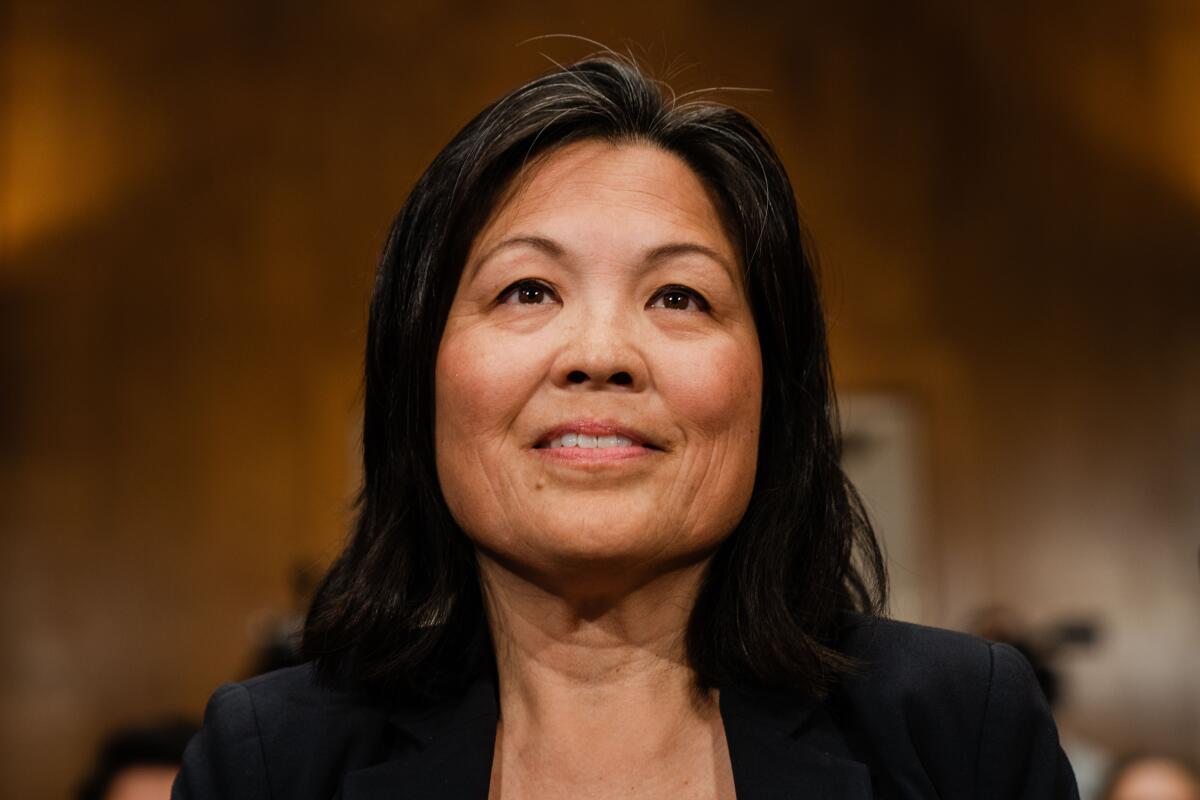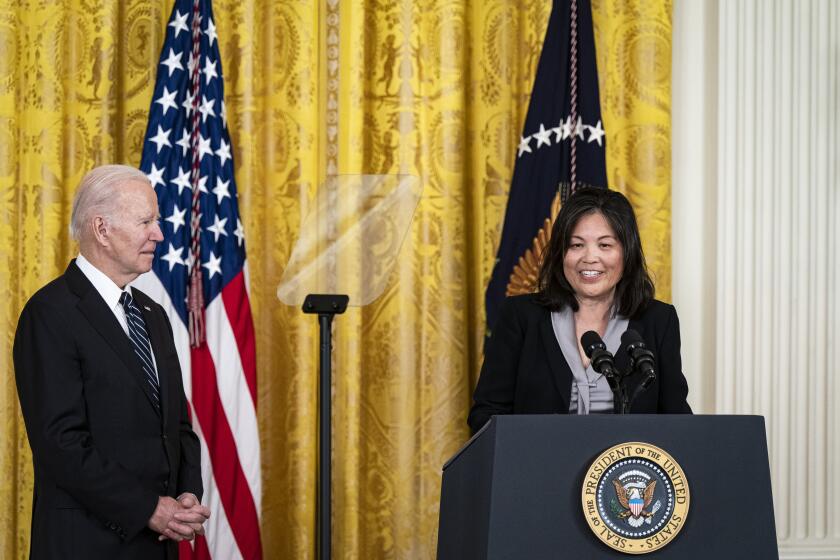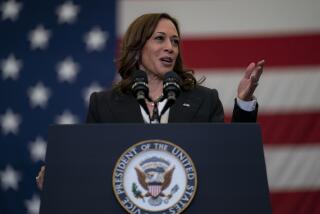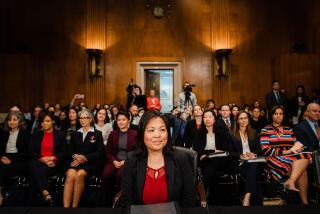With key Democratic senators undecided, Julie Su’s bid for Labor secretary languishes

Former California labor chief Julie Su’s bid to become President Biden’s Labor secretary is languishing, showing how hard it can be for a progressive Californian to win Senate confirmation in a deeply divided Washington.
Su, who would be Biden’s first Asian American Cabinet secretary, was nominated for the job in February and has served as acting secretary since March. She faces fierce GOP opposition and will need unanimous or near-unanimous support from the Senate Democratic caucus to win confirmation. But Sens. Mark Kelly (D-Ariz.), Joe Manchin III (D-W.Va.), Kyrsten Sinema (I-Ariz.) and Jon Tester (D-Mont.) have yet to make up their minds. Manchin, Sinema and Tester are up for reelection in 2024, raising the stakes of their decisions.
For the record:
2:21 p.m. June 14, 2023A previous version of this article stated that Su was at the helm of Caifornia’s Labor and Workforce Development Agency for seven years. She led California’s Division of Labor Standards Enforcement for seven years.
“We’re not there yet,” Sen. Mazie Hirono (D-Hawaii), a longtime champion of Su, told The Times on Monday. “We are going to push for the votes that she needs, and that’s it. Whatever is the reluctance, we need to address them and get her over the hurdle.”
A group called Stand Against Su, which describes itself as “a coalition of small businesses, freelancers, tipped workers and franchisees working together to oppose Julie Su,” paid for billboard ads in key senators’ states attacking Su. “Biden nominee Julie Su wants to turn Montana into California,” reads one ad. “Biden nominee Julie Su wants to turn the lights off in West Virginia,” another warns.
In press statements, Republicans have described Su as an anti-business policymaker who supports laws that make it harder for employers and employees to do their jobs. They’ve tied her to Assembly Bill 5, a California law that requires companies to classify most workers as employees, not independent contractors. They argue that, if confirmed, Su would advance similar policies on a national level, preventing gig workers from taking on jobs they want. Su has said she will not pursue a national equivalent of AB 5.
Republicans also have pointed to Su’s oversight of California’s Employment Development Department, which in 2021 reported $20 billion in fraudulent unemployment claims. Her supporters say Su inherited an already broken system when she took over the department, and they note that employment fraud rose across the country during the COVID-19 pandemic.
“Because of her misguided record in California, we have major concerns about potential disastrous ramifications at the federal level if Ms. Su becomes Secretary. For these reasons, we request that you withdraw her nomination to serve as your next Secretary of Labor,” House Republicans, including Speaker Kevin McCarthy of Bakersfield, wrote in an April letter to President Biden.
Before arriving in Washington, Su rapidly rose through the ranks of labor regulators, spending seven years at the helm of California’s Division of Labor Standards Enforcement. Two years ago, the Senate voted along party lines to confirm Su as deputy secretary of Labor. Those familiar with Su say she hasn’t changed since then. But the political climate has shifted, making her confirmation less certain.
“I don’t think anything has changed with regard to her qualifications or her ability to do the job,” said Bill Wong, a longtime Democratic strategist. “I think what has changed is the political calculus Republicans are banking on in order to try to take over the Senate.”
Blocking Su’s nomination serves an important political purpose for Republicans, Wong added: The GOP wants to “make the presidency look weak by stonewalling any of his nominations.”
White House aides remain convinced they can ensure Su’s confirmation.
White House Press Secretary Karine Jean-Pierre told reporters Tuesday afternoon that the “full-court press” to confirm Su that the White House announced last month is still underway. Senior White House officials gather every night on a “war room” call to share updates on her nomination. White House Chief of Staff Jeff Zients and legislative affairs director Louisa Terrell, Jean-Pierre added, have been speaking regularly with Senate Majority Leader Charles E. Schumer (D-N.Y.) and other key senators about Su’s nomination “multiple times a week,” including during the peak of the debt ceiling fight.
But the administration’s efforts won’t be enough if Schumer can’t find 50 votes for Su.
Manchin has given no timeline on his decision. Sen. Lisa Murkowski of Alaska, a Republican who occasionally supports Biden’s Cabinet picks, has yet to make a decision on Su, and could balance out one Democratic vote against the acting secretary.
Julie Su, formerly state Labor secretary under Gov. Gavin Newsom, has the strong support of unions and some California businesses. But Republicans and other industry groups are rallying against her confirmation.
Senate confirmations often move slowly. Los Angeles Mayor Eric Garcetti waited nearly two years before winning confirmation as U.S. ambassador to India. Like Su, he had full support from the White House, but struggled to win over certain senators.
Opposition to Su’s confirmation has been on a large scale and highly publicized, Hirono pointed out. The senator said she was surprised by the lengths business groups have gone to “scare” voters about a potential Su confirmation.
“That is something unique to me,” Hirono said. “Big money has come out and put up billboards in certain states to encourage those senators to think twice before voting for her.”
Asked whether those tactics are working, Hirono hesitated. “Let’s just say we’re not there yet,” she said.
Danielle Cendejas, a Democratic strategist, said the battle over Su’s nomination has cast a qualified candidate into a tired political tug of war between business and labor interests.
“You have a person who’s highly qualified, probably more than qualified, to take this job, caught in a battle that we see play out at every level of politics,” Cendejas said. “You have business versus labor.”
Su wasn’t involved in the drafting of AB 5, although she did provide some technical assistance at the end of the process, and her supporters have repeatedly stressed that the California Legislature devised the bill. But according to Tim Lineberger, a former advisor to Alex Acosta, who served as secretary of Labor under then-President Trump, Su will always be attached to the legislation because she enforced it. The messaging around AB 5 isn’t what’s holding up her confirmation, he said.
“It really doesn’t matter how you message it, if they’re concerned about where she is on the policy. ... She can try to explain it however she wants to,” Lineberger said.
Others say the choice of tying Su to AB 5 is part of a larger Republican strategy to portray California politicians as symbols of California.
“This is the latest example of California being used against somebody who is more than qualified for the job,” Cendejas said. “I do think that this is a habit of theirs. It doesn’t matter which Californian it is — they find a way to use that against people.”
Schumer and his team are in charge of deciding when to put Su’s confirmation to a vote. He has not scheduled one. Larry Huynh, a political strategist whose firm has partnered extensively with Schumer, said the delay isn’t atypical for a Senate split so narrowly down the middle.
In this case, Huynh and Wong argued, Republican opposition to Su could come back to bite them. Hunyh noted that the Asian American and Pacific Islander community is an important voter bloc that Washington tends to overlook.
“Either party should think twice about playing politics over a candidate that is this qualified for the position who’s also AAPI,” he said.
More to Read
Get the L.A. Times Politics newsletter
Deeply reported insights into legislation, politics and policy from Sacramento, Washington and beyond. In your inbox three times per week.
You may occasionally receive promotional content from the Los Angeles Times.












